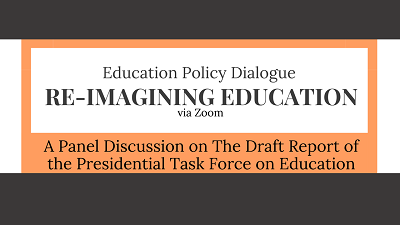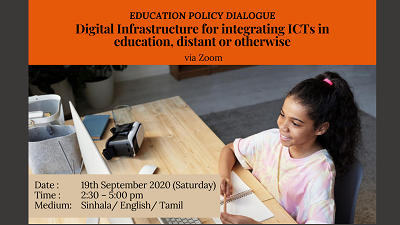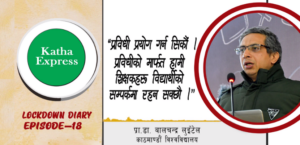Do not let the Covid education crisis become a generational catastrophe | කෝවිඩ් අධ්යාපන අර්බූදය පරම්පරා ගණනකට බලපාන අධ්යාපන ඛේදවාචයක් වෙන්න දෙන්න එපා. | கோவிட் கல்வி நெருக்கடியானது தலைமுறையினர்களை பாதிக்கும் கல்வி சோகமாக மாற ஒரு போதும் இடமளிக்க வேண்டாம். Dr. Tara de Mel The whole world is in the middle of a pandemic. Beginning around March 2020, schools across the world had to close at once, for first time since World War II.

A policy dialogue on “Reopening schools and education delivery until then” was held by the Education Forum Sri Lanka (EFSL) on May 15th, 2021, via Zoom. LINKS: Full Video: PD#15, 2 hours 33 minutes (In Sinhala) PRESENTATIONS Dr. Tara de Mel, Former Secretary, Ministry of Education Ms. Renuka Peiris, Former Director, Health and Safety, Ministry of Education Mr. R.
Ten-Point Policy for Mitigating the Covid Education Crisis | කෝවිඩ් අධ්යාපන අර්බුදයට මුහුණ දීමට අට වැදෑරුම් ප්රතිපත්තියක් | கோவிட் கல்வி நெருக்கடிக்கு முகங்கொடுக்க 10 உந்துவதற்கான கொள்கை அம்சங்கள் May 07, 2021 [English write up is followed by Sinhala and Tamil versions] We have a Covid Education Crisis. The school education system in Sri Lanka has been dysfunctional for 15 months. The epidemic has left >50% of students uncontactable, and those who are contacted experience one-way communication with content delivered to them over social media like WhatsApp. Only 5% received a real-time online education experience using software such as Zoom or Teams. Education Forum Sri Lanka calls upon the Ministry of Education Sri Lanka and Provincial Departments of Education to recognize and act on the following without delay: Content delivered over TV, WhatsApp or in print form is not education: The archaic transmission mode of education practiced in the Sri Lankan education system came to the fore during COVID-19.
To our knowledge, the non-state sector in higher education in Sri Lanka is largely undocumented. The only comprehensive survey available was carried out by the Education Forum Sri Lanka (EFSL) in 2012 in partnership with LIRNEAsia and the Ceylon Chamber of Commerce. The information is reposted here in the public interest. The higher education landscape is captured as a directory  of Higher education opportunities in Sri Lanka containing a listing of all degree programs offered by alternative higher education institutions or institutions that are outside the purview of the University Grants Commission (UGC) mediated system of 14 public universities and affiliated Institutions. The alternative system consists of: 10 PUBLIC institutions which admit students on their own charging nominal to significant amounts as fees and offering 41 degree programs.

A dialogue reviewing the report was held on November 21, 2020, via Zoom LINKS Full Video: PD#9, 2 hours 30 minutes Documents: Summary PTF Report; Core Group Reports OVERVIEW: The education reform plan of the Presidential Task Force is visionary and comprehensive, but it does not address (1) Strategies for effective implementation (2) Limitations such as political interference(3) Inefficiencies in administration, (4) Lack of empowerment of teachers, and the (5) Reality of insufficient funding. A more strategic approach identifying a few pivotal strategies and how they can be implemented is needed. EFSL will present a brief on such a strategic approach using the inputs from this dialogue. PRESENTATIONS School education – Dr. Tara De Mel, Education Forum Sri Lanka (EFSL) Tertiary Education including higher education – Prof Arjuna Parakrama, University of Peradeniya – IT enabled education – Ms.

Held on September 19, 2020, via Zoom VIDEO:Â Click here PRESENTATIONS Introduction – Dr. Tara de Mel Master Plan for ICT in Education -Â Prof. Kapila Perera, Secretary, Ministry of Education and former Vice Chancellor, University of Moratuwa Digital Infrastructure – Mr. Indika de Zoysa, Vice President, Enterprise Business Group, Huawei Technologies Lanka Integrating ICT into Education – Mr. Hasitha Dela, CEO, Headstart Response & Comments – Dr.

Prof. Bal Chandra Luitel, School of Education, Kathmandu University (Translated from Nepalese by Bineeta Baral) Lock-down has changed every day life’s activity not only mine but everyone else. If I have to talk about me, I used to reach the University around 11 am and stayed there until 6 pm and during evening classes until 8:30 pm. I have now shifted my evening classes to the day time. They no go on from 3 pm to 5 pm.
අලුà¶à·Š කà·à¶¶à·’නෙට්ටුවේ අධ්යà·à¶´à¶± විෂය පෙර à·€à·à¶» වල මෙන් à¶à·”න් අà¶à¶šà¶§ නොකඩ෠එක් ඇමà¶à·’වරයකුටම බà·à¶» දීල෠à¶à·’යෙනවà·.. ඇà¶à·Šà¶à¶§à¶¸ මà·à¶½à·šà·ƒà·’යà·à·€ à·„à·à¶»à·”ණු කොට ආසිය෠කලà·à¶´à¶ºà·š ඉන්දියà·à·€, බංග්ලà·à¶¯à·šà·à¶º, සිංගප්පූරුව, ඉන්දුනීසියà·à·€, à¶à·à¶ºà·’ලන්à¶à¶º, දකුණු කොරියà·à·€ à·„à· à¶à·à¶ºà·’à·€à·à¶±à¶º යන සෑම රටකම අධ්යà·à¶´à¶± විෂය භà·à¶»à·€ සිටින්නේ ඒක ඇමà¶à·’ වරයකු පමණි. මà·à¶½à·šà·ƒà·’යà·à·€à·š උසස් අධ්යපනය සඳහ෠වෙනම අමà·à¶à·Šà¶ºà¶‚à·à¶ºà¶šà·Š à¶à·’යෙනවà·. අපේ රටà¶à·Š ඒ පෙලට එක් වුනු ඒක ගà·à¶± à·ƒà¶à·”ටුයි.
In Sri Lanka, with a population of 22 million, 11,000 schools closed on March 12th affecting 4.5 million students. The situation in Indonesia parallels Sri Lanka though Indonesia’s population at 268 million is ten times that of Sri Lanka. According to a World Bank blog, in Indonesia, over 530,000 schools closed affecting 65 million students. The situation is forcing a very fast and broad increase in the country’s use of EdTech, which is expected to have lasting effects on the market.
In her column why character education is an imperative for Sri Lanka, HGS Premarathna, or Sajitha Preamrathna argues eloquently that good character is more important than ever, and posits, as the title indicates, it should be taught in schools. I have reservations about both arguments. In the first instance, she quotes Andrew Lickona who justifies the need for character education. According to Lickona, “There is a clear and urgent need [for character education]. Young people are increasingly hurting themselves and others and are decreasingly concerned about contributing to the welfare of others.
 A policy dialogue on “Reopening schools and education delivery until then” was held by the Education Forum Sri Lanka (EFSL) on May 15th, 2021, via Zoom. LINKS: Full Video: PD#15, 2 hours 33 minutes (In Sinhala) PRESENTATIONS Dr. Tara de Mel, Former Secretary, Ministry of Education Ms. Renuka Peiris, Former Director, Health and Safety, Ministry of Education Mr. R.
A policy dialogue on “Reopening schools and education delivery until then” was held by the Education Forum Sri Lanka (EFSL) on May 15th, 2021, via Zoom. LINKS: Full Video: PD#15, 2 hours 33 minutes (In Sinhala) PRESENTATIONS Dr. Tara de Mel, Former Secretary, Ministry of Education Ms. Renuka Peiris, Former Director, Health and Safety, Ministry of Education Mr. R.  A dialogue reviewing the report was held on November 21, 2020, via Zoom LINKS Full Video: PD#9, 2 hours 30 minutes Documents: Summary PTF Report; Core Group Reports OVERVIEW: The education reform plan of the Presidential Task Force is visionary and comprehensive, but it does not address (1) Strategies for effective implementation (2) Limitations such as political interference(3) Inefficiencies in administration, (4) Lack of empowerment of teachers, and the (5) Reality of insufficient funding. A more strategic approach identifying a few pivotal strategies and how they can be implemented is needed. EFSL will present a brief on such a strategic approach using the inputs from this dialogue. PRESENTATIONS School education – Dr. Tara De Mel, Education Forum Sri Lanka (EFSL) Tertiary Education including higher education – Prof Arjuna Parakrama, University of Peradeniya – IT enabled education – Ms.
A dialogue reviewing the report was held on November 21, 2020, via Zoom LINKS Full Video: PD#9, 2 hours 30 minutes Documents: Summary PTF Report; Core Group Reports OVERVIEW: The education reform plan of the Presidential Task Force is visionary and comprehensive, but it does not address (1) Strategies for effective implementation (2) Limitations such as political interference(3) Inefficiencies in administration, (4) Lack of empowerment of teachers, and the (5) Reality of insufficient funding. A more strategic approach identifying a few pivotal strategies and how they can be implemented is needed. EFSL will present a brief on such a strategic approach using the inputs from this dialogue. PRESENTATIONS School education – Dr. Tara De Mel, Education Forum Sri Lanka (EFSL) Tertiary Education including higher education – Prof Arjuna Parakrama, University of Peradeniya – IT enabled education – Ms.  Held on September 19, 2020, via Zoom VIDEO: Click here PRESENTATIONS Introduction – Dr. Tara de Mel Master Plan for ICT in Education - Prof. Kapila Perera, Secretary, Ministry of Education and former Vice Chancellor, University of Moratuwa Digital Infrastructure – Mr. Indika de Zoysa, Vice President, Enterprise Business Group, Huawei Technologies Lanka Integrating ICT into Education – Mr. Hasitha Dela, CEO, Headstart Response & Comments – Dr.
Held on September 19, 2020, via Zoom VIDEO: Click here PRESENTATIONS Introduction – Dr. Tara de Mel Master Plan for ICT in Education - Prof. Kapila Perera, Secretary, Ministry of Education and former Vice Chancellor, University of Moratuwa Digital Infrastructure – Mr. Indika de Zoysa, Vice President, Enterprise Business Group, Huawei Technologies Lanka Integrating ICT into Education – Mr. Hasitha Dela, CEO, Headstart Response & Comments – Dr.  Prof. Bal Chandra Luitel, School of Education, Kathmandu University (Translated from Nepalese by Bineeta Baral) Lock-down has changed every day life’s activity not only mine but everyone else. If I have to talk about me, I used to reach the University around 11 am and stayed there until 6 pm and during evening classes until 8:30 pm. I have now shifted my evening classes to the day time. They no go on from 3 pm to 5 pm.
Prof. Bal Chandra Luitel, School of Education, Kathmandu University (Translated from Nepalese by Bineeta Baral) Lock-down has changed every day life’s activity not only mine but everyone else. If I have to talk about me, I used to reach the University around 11 am and stayed there until 6 pm and during evening classes until 8:30 pm. I have now shifted my evening classes to the day time. They no go on from 3 pm to 5 pm. 